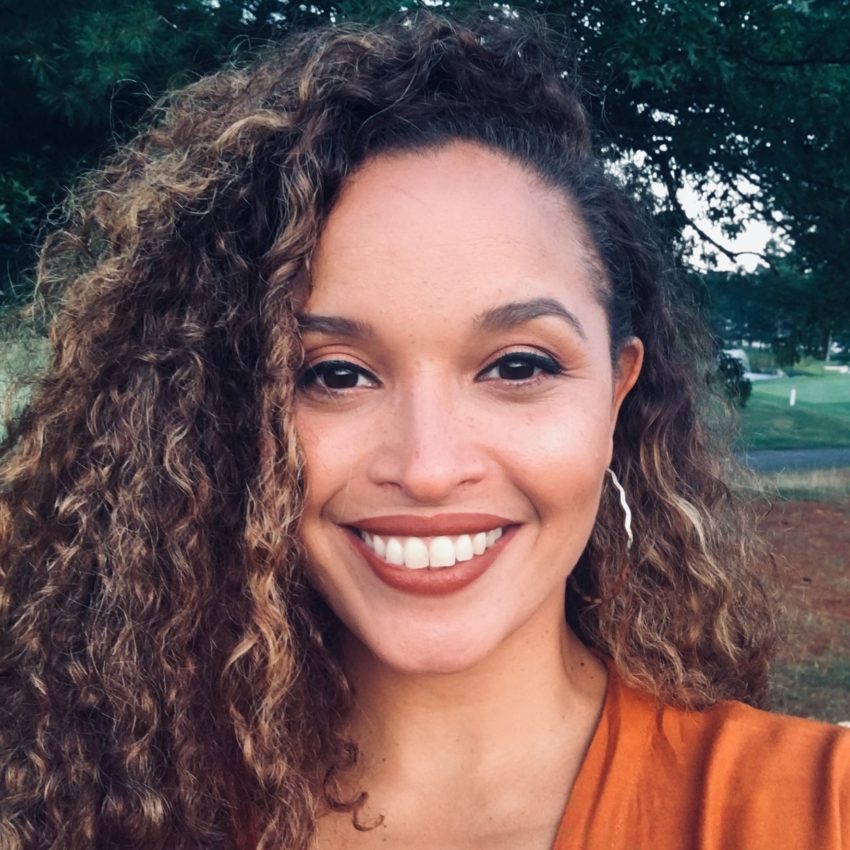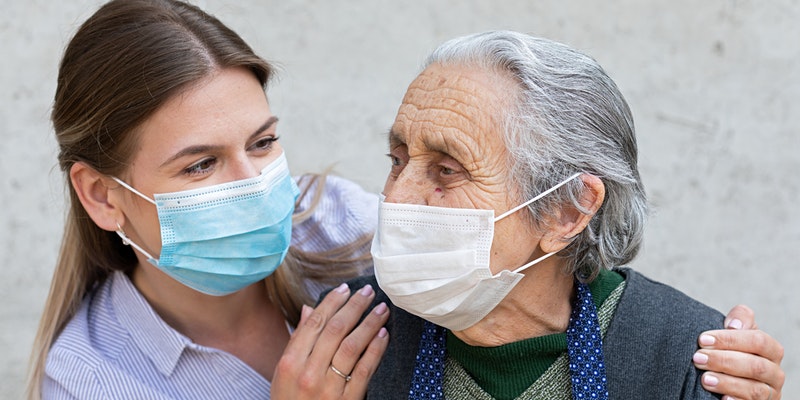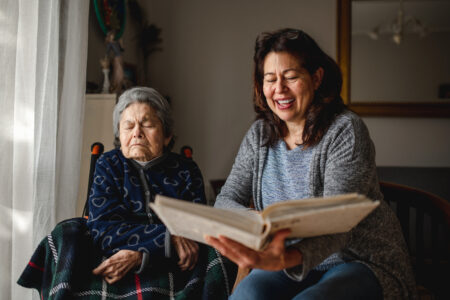
Share On Social!
Dr. Mirella Díaz-Santos has a personal fight to end Alzheimer’s Disease.
Her grandmother was diagnosed with Alzheimer’s when Díaz-Santos was in school.
“I needed to know more about how this ‘disease’ can change someone who you love so much. How can it change it completely?” Díaz-Santos said.
Díaz-Santos is an assistant professor in residence at University of California at Los Angeles (UCLA) in the department of neurology and psychiatry.
She’s also the director of research of the Hispanic Neuropsychiatric Center of Excellence at the Semel Institute for Neuroscience and Human Behavior and is involved with the Women’s Alzheimer’s Movement to bring awareness to Alzheimer’s within the Latino community.
Although she’s experienced bias and discrimination while pursuing her career, Díaz-Santos is committed to fight Alzheimer’s and protect others in the Latino community.
Becoming an Alzheimer’s Researcher
Díaz-Santos was born and raised in Loíza, Puerto Rico, where her whole family still lives.
“I’m the first one in my family to navigate higher education, because my parents had me when they were young,” Díaz-Santos said.
She was introduced to her career through a psychology 101 class during her undergraduate at the University of Puerto Rico, where she became fascinated by brain cognitive science.
Díaz-Santos applied and was accepted into several summer internships. She did research at University of California at San Diego, Rutgers University, and Boston University.
While doing her summer research internship at Boston University, she met her future grad school advisor, who encouraged her to pursue neuropsychology for her master’s degree.
“We had a really great bond. We were researching cognition, HIV, Parkinson’s, Alzheimer’s and healthy aging. So when I applied for grad school, I started working with her mostly in the healthy aging and Parkinson’s disease area,” Díaz-Santos said.
As a grad student, Díaz-Santos often felt that what she was learning in class didn’t connect with what she experienced in her community.
“Yeah, I understand the theory, and yes, I understand the methodology. But for some reason, I just don’t quite see how this will fit our different communities of color. So I was very vocal in advocacy and understanding how culture and language and social context impact the brain, impact cognition, testing and performance,” Díaz-Santos said.
After obtaining her master’s and PhD in neuropsychology from Boston University, Díaz-Santos moved to Los Angeles to do a postdoctoral fellowship at UCLA.
“UCLA, at that time, had the only program where it was focused on Latinx communities. It was Latino/Latina supervisors, only Latino/Latina/Latinx patients, and it was following evidence-based strategies and methodologies and I wanted that,” Díaz-Santos said.
Díaz-Santos eventually became an assistant professor at UCLA. She focuses on Alzheimer’s in aging Latino communities.
She’s also involved in other projects, like the Women’s Alzheimer’s Movement, which funds institutions and programs to research disparities in Alzheimer’s and dementia.
Experiencing Bias & Discrimination During Her Career
As a Latina in academia, Díaz-Santos has often come across discrimination and bias.
Many Latinos and other people of color experience racial/ethnic discrimination, which can impact future educational, health, social, and career opportunities, according to a Salud America! research review.
“Unfortunately, from the beginning, the message that I always have received, even in grad school from different faculty members, constantly and constantly is, ‘Are you sure you want to be here?’ And they were questioning us, ‘Are you sure you have what it takes to be here?’” Díaz-Santos said.
Comments like that gave Díaz-Santos imposter syndrome, making her question if she belonged in the program and if she was smart enough to do it.
She also experienced microaggressions about her appearance and was told it wasn’t professional.
Microaggressions are indirect or subtle acts of discrimination against a marginalized group.
“There was a consistent message that I needed to change who I was. I have Black hair, like curly, big. But I got comments like, ‘it needs to be straight’ and ‘you need to make sure that you don’t wear your hoops.’ But I am Latina, so hoops are a part of our identity and I love the hoops. But it’s like ‘No, you cannot have the hoops because you want to be perceived as professional.’ But why is it that my identity, my racial, ethnic, nationality, identities are not deemed professional?” Díaz-Santos said.
The experience has shown her the importance of representation and bringing her authentic self into her work.
“Throughout my whole career, even till this day, I had to be very intentional that the only way that I can do my passion and my vocation with my clinical work, practice, and research training is if I’m authentic. Even with my thick accent,” Díaz-Santos said.
It’s important for those in healthcare to address implicit biases, so people like Díaz-Santos don’t experience discrimination.
Healthcare workers can identify their own implicit biases and work to address them with Salud America’s Action Pack: “Health Care Workers and Researchers: Find If You Have Implicit Bias and What to Do Next.”
Alzheimer’s in the Latino Community
At UCLA, Díaz-Santos works to increase knowledge about Alzheimer’s, improve access to treatment, and increase participation of Latinos in clinical trials.
Alzheimer’s disproportionately affects Latinos, who are 1.5 times more likely to develop the disease.
The disparity is due to structural forces, according to Díaz-Santos.
“What I’ve been hearing throughout my very young career is that our communities have higher rates of diabetes, and hypertension, and hyperlipidemia. Now more and more academics and individuals are talking about how social and structural determinants of health are increasing the disproportionate rate of Alzheimer’s and all the types of dementia in our communities of color,” Díaz-Santos said.
Additionally, Latinos also face many barriers to treatment, like lack of insurance, language barriers, cost, and transportation.

Many Latinos are not even a part of the healthcare system, says Díaz-Santos.
“We know that a lot of our Latino community members don’t have health insurance. A lot of our community members have visas or come from an immigrant background. The citizenship component is a conversation that we typically don’t have,” Díaz-Santos said.
Latinos may also lack access to the specialty care needed to diagnose and treat Alzheimer’s.
“With Alzheimer’s, the diagnosis and the treatment are made by an interdisciplinary team that includes neurology, neuropsychology, geriatrics, and neuropsychiatry. It’s very interdisciplinary, which means that how many community hospitals do we have nearby our Latino communities and neighborhoods? And how many of those of those community hospitals have all these specialties?” Díaz-Santos said.
Having access to a healthcare provider who can give culturally tailored and relevant care is also vital.
“How can we get the treatment, finding a doctor who looks like me and speaks my language and understands what I’m going through without the fear of discrimination, or just being brushed off, or being given an erroneous diagnosis? Then you have to travel long distance for an academic institution,” Díaz-Santos said.
These barriers can either delay or prevent diagnosis, which sometimes doesn’t make treatment possible.
That’s why increasing Latino representation in clinical trials is key.
How Díaz-Santos Builds Trust Among Latinos to Recruit for Clinical Trials
Clinical trials help researchers improve treatment for current patients or better understand illnesses to help future patients.
Unfortunately, Latinos make up less than 10% of federal cancer and drug studies, despite making up 18.5% of the population.
The underrepresentation comes from a lack of access to information about clinical trials and historical mistrust of medical treatments, according to Díaz-Santos.
“Here in Southern California with the eugenics movement in the 60s and 70s, those stories continue to be passed along from generation to generation. Researchers and physicians need to take accountability for the history, and then do whatever is in our power to restore it, with the intention of asking the community exactly what they need,” Díaz-Santos said.

Building trust with communities who have been let down by medical professionals in the past means that researchers should focus on reciprocity and giving community members what they need.
“We can eventually create more trust and have this transparency in our conversation about why it’s important to engage in clinical trials and how can we help. How can I assist you in making that decision if you think that it’s feasible for you?” Díaz-Santos said.
When focusing on reciprocity, her goal is not to convince someone to enroll in a clinical trial if they aren’t ready yet.
Díaz-Santos wants to inform other Latinos about what the research is and break down the medical jargon before trying to recruit someone.
“How do we just engage in those conversations? They have questions about what MRIs or PET scans are, or what is cognition or what is cognitive testing? Just break it down into different educational brochures or workshops or very in-depth dialogues,” Díaz-Santos said.
Díaz-Santos is currently working on a project that involves social connection with isolated Spanish-speaking older adults.
“We are engaging in a conversation, a dialogue about what the hippocampus is, and they can read it as an analogue. They’re like, ‘Oh, you mean that the hippocampus is like una bodega, it’s like a storage unit.’ And I’m like, ‘Yes!’ Then we continue to cultivate that conversation. And then I have 80-something year old amazing older adults that are talking about hippocampus and amygdala and how we have to engage in healthy lifestyles, so the hippocampus is healthy. That’s how you get engaged with them. And now, I’m more ready to have a conversation about clinical trials, because I know what I’m getting into,” Díaz-Santos said.
She always ensures that she is giving something to her community and helping them with their needs if she wants to recruit them to her own work.
“If we want our Latinos to engage in clinical trials, we want to make sure that if something is missing, that we will engage with social workers, case managers, counselors, we have all the infrastructure to facilitate their participation,” Díaz-Santos said.
What Drives Her: Fighting for Latino Caregivers
The work that Díaz-Santos does is hard, especially as it hits close to home.
“Alzheimer’s and any other type of dementia diagnosis is a family journey. We have to acknowledge that we have the individual with the disease, but we also have the family and the caregivers who typically are the women of our families,” Díaz-Santos said.
Díaz-Santos keeps pushing for the Latino families who are dismissed when taking care of a family member with Alzheimer’s.
“I keep hearing the same stories over and over again, that ‘I wasn’t taken seriously when I approached the doctor with a memory complaint’ or ‘I was diagnosed with dementia, but my family was not there,’ which doesn’t follow clinical recommendations,” Díaz-Santos said.
Unfortunately, the experience hasn’t changed much since her own grandmother was diagnosed in 2005.
“I recently found out that that’s exactly how my grandmother was diagnosed. She went to her PCP, the PCP gave her I don’t know what kind of cognitive screening, asked her some questions, then diagnosed her with dementia right there. And neither my mom, my aunt, or my uncle were there present to know what was going on,” Díaz-Santos said.
Díaz-Santos wants to help other Latino families navigate what she felt back then.
“That hopelessness that I felt and that my family felt is still very alive in our communities, and that gives me the passion to keep fighting and keep moving forward,” Díaz-Santos said.
How Can Fight Alzheimer’s and Help Latinos Join Clinical Trials?
Like Díaz-Santos, many Latino researchers are working to improve representation in clinical trials and fight Alzheimer’s and dementia in the Latino community.
To address this issue, Salud America! is holding a webinar in collaboration with the Mays Cancer Center at UT Health San Antonio and Genentech, a member of the Roche group.
The webinar, “How to Encourage Latinos to Participate in Clinical Trials,” will take place on Dec. 14, 2021 via Zoom.
This webinar will help health care professionals understand the lack of Latino participation in clinical trials and explore strategies and system-changing advocacy actions to improve Latino enrollment in clinical trials.
Panelists Dr. Patricia Chalela, a Latino cancer researcher at UT Health San Antonio, Dr. Marcela Mazo Canola, a physician at the Mays Cancer Center, and Jeraldine Ortiz, a breast cancer survivor and clinical trial participant, will partake in a discussion moderated by Dr. Amelie G. Ramirez, director of Salud America! and the Institute for Health Promotion Research at UT Health San Antonio.
By The Numbers
142
Percent
Expected rise in Latino cancer cases in coming years
This success story was produced by Salud America! with support from the Robert Wood Johnson Foundation.
The stories are intended for educational and informative purposes. References to specific policymakers, individuals, schools, policies, or companies have been included solely to advance these purposes and do not constitute an endorsement, sponsorship, or recommendation. Stories are based on and told by real community members and are the opinions and views of the individuals whose stories are told. Organization and activities described were not supported by Salud America! or the Robert Wood Johnson Foundation and do not necessarily represent the views of Salud America! or the Robert Wood Johnson Foundation.



